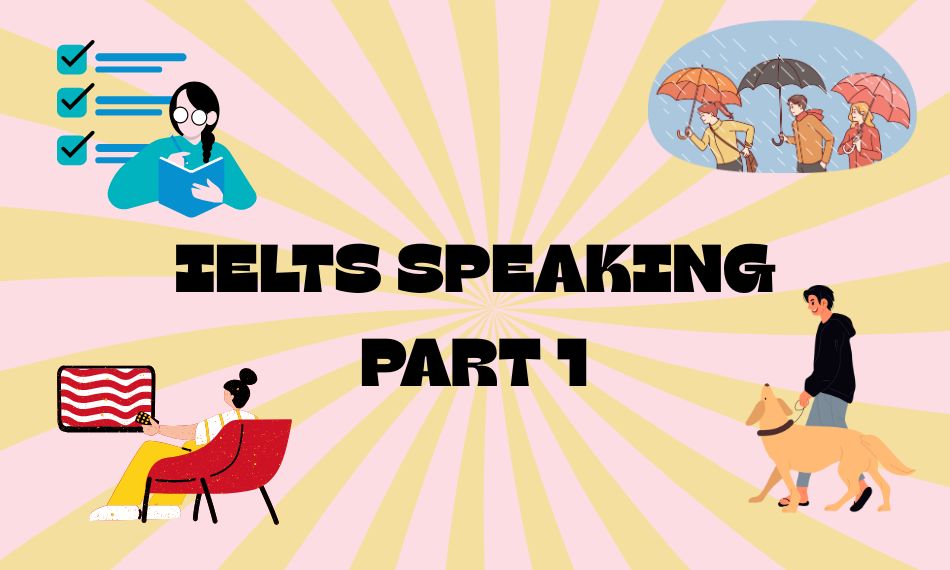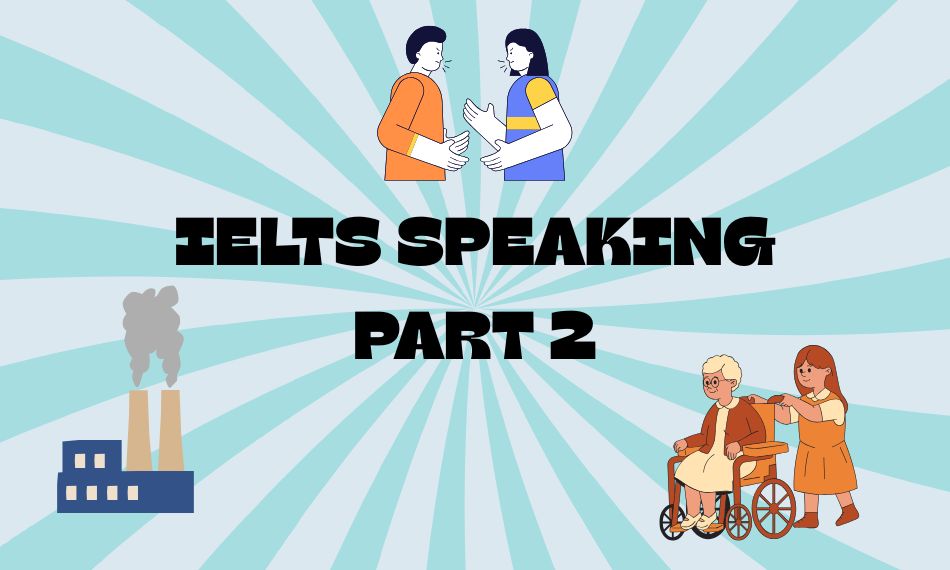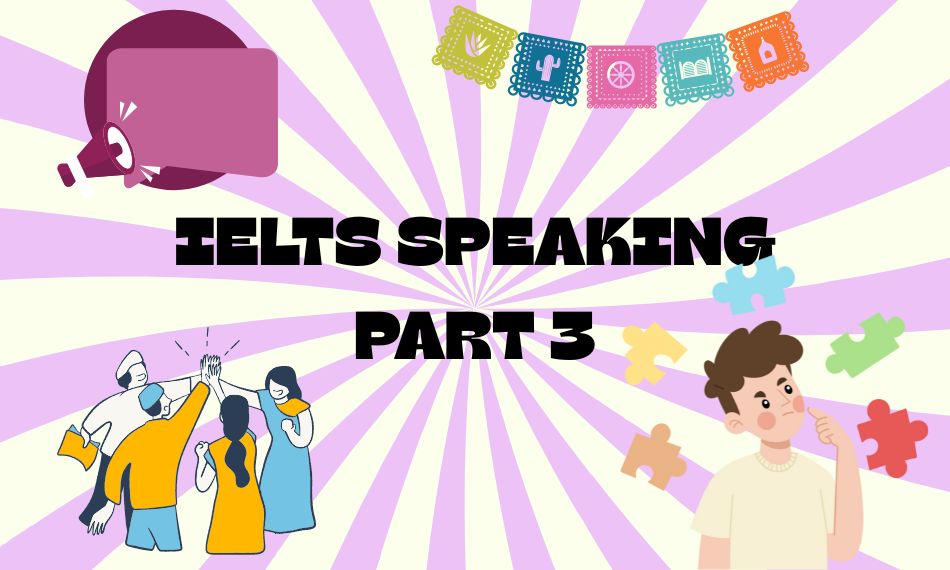Most Common Questions in IELTS Speaking (With Answers)
Achieving a high score on the IELTS Speaking test requires thorough preparation, and a critical component is familiarizing oneself with the most common questions in IELTS Speaking. This comprehensive guide, developed by the educational experts at IELTS-Testpro, provides an authoritative breakdown of the test’s structure, formalized sample responses, and expert IELTS speaking strategies. By understanding these patterns, candidates can significantly improve their confidence, fluency, and overall band score.
I. Overview of the IELTS Speaking Test
Before diving into the most common questions in IELTS Speaking, it’s important to understand the structure of the test. The IELTS Speaking test lasts 11 to 14 minutes and is divided into three parts. Each part is designed to assess different aspects of your English communication skills:
Part 1: Introduction and Interview (4–5 minutes)
This initial section focuses on general, personal topics. The examiner poses questions on familiar subjects to establish a baseline for assessment and ease the candidate into the test environment.
Common Topics: These frequently include the candidate’s hometown, occupation or area of study, hobbies, daily routines, family, and personal preferences (e.g., cuisine, climate, music).

Common 2025 Inquiries: Recent candidates have reported questions such as:
-
- “Do you have a preference for mornings or evenings?”
- “What type of food do you typically consume?”
- “What is your frequency of engaging in shopping?”
The repetitive nature of these questions across examinations means that preparation affords a significant advantage.
Part 2: Long Turn (3–4 minutes)
In this part, you’ll need to use essential vocabulary to describe a given topic clearly and effectively. You have 1 minute to prepare and then speak for up to 2 minutes. Most common questions in IELTS Speaking Part 2 usually ask you to describe a person, place, event, experience, or object.

Cue cards often include prompts like:
- Describe a time you helped someone
- Describe a book or movie you liked
- Describe a person you admire
- Describe a skill you want to learn
You’ll need to organize your response, use a clear structure, and try to speak without long pauses. This part checks your ability to develop an idea, use linking words, and speak fluently for an extended time.
Part 3: Discussion (4–5 minutes)
This final part is like a mini-debate or academic discussion. The examiner will ask more complex follow-up questions related to the Part 2 topic. Here, you’re expected to express opinions, justify your ideas, compare situations, and analyze issues.

The examiner is checking your ability to:
- Express ideas clearly and in depth
- Use logical reasoning and critical thinking
- Show a range of academic or topic-specific vocabulary
- Compare and contrast different points of view
Most common questions in IELTS Speaking part 3 might include:
- Education: What are the advantages of studying abroad?
- Technology: How has technology changed the way we work or study?
- Environment: What can individuals do to help protect the environment?
- Health: Why do some people find it hard to live a healthy lifestyle?
- Travel and Tourism: How does tourism affect local cultures and traditions?
- Work and Career: What makes a good workplace environment?
- Family and Relationships: Do you think family roles have changed in modern society?
- Media and Communication: How important is the news in people’s daily lives?
- Culture and Traditions: Why is it important to preserve cultural traditions?
These questions often start with “Do you think…”, “Why…”, “What are the benefits…”, or “How has…”, which invite longer, more thoughtful answers. Don’t be afraid to give examples, comparisons, or even small personal experiences to support your points.
II. Mastering the Most Common Questions in IELTS Speaking Part 1
Part 1 provides an opportunity to establish a strong, positive impression. To achieve this, candidates must provide detailed, extended responses rather than simple, monosyllabic replies. Below are five common IELTS Speaking Part 1 questions reported in 2025, with formal sample responses.

1. What do you do? Work or study?
Sample Response: “I am currently enrolled as a final-year university student, majoring in Computer Science at XYZ University. I selected this field of study due to a persistent fascination with technology and its underlying mechanisms. While the curriculum is demanding, I find the problem-solving and practical application aspects to be highly rewarding.”
Strategy:
- Direct Response: Begin with a clear, direct answer.
- Elaboration: Add specific details (e.g., institution, major).
- Conclusion: Conclude with a justification or personal perspective.
2. Do you live in a house or an apartment?
Sample Response: “I reside in an apartment with my family. It is a three-bedroom flat located on the fifth floor of a building in the city center. We have occupied this residence for approximately six years. I find this location highly advantageous due to its convenience, specifically its proximity to my university and essential amenities, such as supermarkets and public parks.”
Strategy:
- Descriptive Language: Use details about size, location, and duration.
- Personal Opinion: Conclude with a personal, reasoned opinion.
3. What kind of weather do you like?
Sample Response: “My preference is for cool, overcast weather, particularly during the autumn season. This climate provides an optimal balance, being neither excessively hot nor cold, which I find more comfortable for daily activities. Furthermore, the air quality often feels improved, and I appreciate the tranquil atmosphere it promotes.”
Strategy:
- Clear Preference: State your preference clearly.
- Reasoning: Explain the reasoning behind your preference.
- Effect: Add details about its effect on your mood or routine.
4. How often do you use social media?
Sample Response: “I utilize social media on a near-daily basis, primarily for communication with friends and to stay informed on topics of interest. My preferred platform is Instagram, as I find content related to travel and cuisine engaging. However, I make a conscious effort to limit my screen time, especially during examination periods.”
Strategy:
- Frequency: State the frequency of use.
- Purpose: Specify the purpose or preferred platform.
- Habit/Opinion: Provide a concluding opinion or description of your usage habits.
5. What do you usually do on weekends?
Sample Response: “Typically, on weekends, I endeavor to balance relaxation with productivity. Saturdays are often allocated for social activities, such as meeting friends for coffee or visiting the cinema. I generally reserve Sundays for academic responsibilities or part-time work. For me, the weekend serves as a crucial period for recuperation following a rigorous week.”
Strategy:
- Temporal Markers: Use markers like usually, sometimes, often.
- List Activities: Mention 2–3 distinct activities.
- Personal Benefit: Conclude with the personal benefit or purpose.
III. Strategies for the Most Common Questions in IELTS Speaking Part 2 (Cue Cards)
Part 2 evaluates the candidate’s ability to structure a coherent narrative and draw upon personal experiences. The most common questions in IELTS Speaking Part 2 require detailed, organized responses.

1. IELTS Speaking Strategies: A 4-Step Method for the Long Turn
The following is an effective, universally applicable structure for addressing any Part 2 cue card topic, ensuring fluency and comprehensive coverage.
- Brief Introduction: Commence by clearly identifying the topic you will discuss.
- “I intend to discuss a time when…”
- “The individual whom I most admire is…”
- Context and Details (When, Where, Who): Establish the background context.
- “This event occurred last summer while I was visiting my hometown…”
- “This was a small café I discovered while accompanied by a friend…”
- Main Narrative (What Happened): This constitutes the core of your response. Describe the event, person, or object in detail.
- “We resolved to… Initially, I felt… Subsequently, the most significant event occurred…”
- “What distinguishes this person is their capacity for…”
- Conclusion (Feelings or Lesson Learned): Conclude your narrative by explaining your feelings or the broader significance of the experience.
- “I felt a profound sense of pride upon its completion.”
- “It proved to be a meaningful experience as it taught me the importance of…”
2. Sample Cue Card Topics and Formal Responses
Below are five recent IELTS Speaking Part 2 questions (cue cards), accompanied by formal sample responses which adhere to the 4-step structure.
2.1. Describe a time you helped someone
You should say:
- Who you helped
- When and where it happened
- What you did
- And explain how you felt after helping this person
Sample Response: “I am going to describe an occasion approximately three months ago when I assisted an elderly neighbor with her groceries.
It was a rainy afternoon, and I observed her outside the supermarket with two large bags, appearing visibly fatigued. Recognizing her difficulty, I approached and offered my assistance.
Her apartment was located near mine, so we proceeded there together. During our walk, she mentioned she had recently undergone surgery, which made walking long distances challenging.
She expressed extreme gratitude and insisted on offering me a small chocolate bar, which was a very kind gesture. This experience reinforced my belief in the importance of community and small acts of kindness, and I felt genuinely positive afterward.”
2.2. Describe a disagreement you had with someone
You should say:
- Who you had the disagreement with
- What the disagreement was
- What happened
- And explain how you felt about it.
Sample Response: “I will discuss a disagreement I experienced with a close friend during a university group project last year. We held very different opinions regarding the presentation of our project. I advocated for a simple, minimalist style, whereas she desired something more creative and elaborate.
We were unable to reach a consensus, and during one meeting, we both became somewhat defensive, which created a tense atmosphere. Later that day, I initiated a conversation to discuss the matter rationally.
Once we calmly explained our respective reasoning, we realized it was a misunderstanding. We ultimately integrated both of our ideas. Initially, I felt frustrated, but I experienced significant relief after we resolved the issue. The situation taught me the crucial importance of clear communication, especially within a team dynamic.”
2.3. Describe a person from another culture you want to spend time with
You should say:
- Who he/she is
- Where he/she is from
- How you knew him/her
- And explain why you want to spend time with him/her.
Sample Response: “I would like to describe an individual from Japan named Yuki, whom I met via an online language exchange platform several months ago. We communicate regularly to practice English and learn about each other’s cultures.
She is of a similar age and is very passionate about traditional Japanese arts, such as tea ceremonies. Should we ever meet in person, I would love to visit Kyoto with her, sample authentic cuisine, and experience her cultural traditions firsthand—perhaps even attend a tea ceremony.
I admire her respectful and disciplined demeanor, which seems deeply rooted in her culture. Spending time with her would be a meaningful opportunity to understand a different way of life and foster greater open-mindedness.”
2.4. Describe a place you visited that was affected by pollution
You should say:
- Where the place was
- When you visited it
- What kind of pollution it was
- And explain how you felt about this place.
Sample Response: “The topic I will discuss is a visit I made to Hanoi, the capital of Vietnam, which was significantly affected by air pollution. This occurred last winter during a brief vacation.
The air quality was perceptibly poor; the sky was consistently hazy, and one could even smell the pollutants. This was clearly attributable to a combination of heavy traffic, construction, and factory emissions, with the Air Quality Index (AQI) at an unhealthy level.
The pervasive smog caused respiratory discomfort, and face masks were ubiquitous. I felt quite uncomfortable and concerned for my health. It was disheartening to witness such a beautiful, historic city impacted by pollution, and it reinforced my understanding of how critical clean air is to quality of life.”
2.5. Describe something you own that you want to replace
You should say:
- What it is
- How you got it
- How long you have had it
- And explain why you want to replace it.
Sample Response: “I am going to describe my old laptop, an item I use daily but urgently need to replace. I received it as a gift from my parents approximately five years ago upon commencing university, so it holds some sentimental value.
I typically use it at my desk for academic and professional tasks. Initially, it functioned perfectly, but now its performance has degraded, and it is slow and frustrating to operate.
It has a long start-up time, the battery life is less than 30 minutes, and it frequently overheats. Furthermore, I have exhausted its storage capacity. Despite my sentimental attachment, it is time for an upgrade. It no longer meets my requirements, and this experience highlights the importance of reliable, efficient tools.”
IV. How to Discuss the Most Common Questions in IELTS Speaking Part 3
Most common questions in IELTS Speaking Part 3 test your critical thinking and ability to discuss topics in depth. Here are some common Part 3 questions with clear tips and smart ways to tackle them. Plus, don’t forget connectors – they link your ideas and make your answers sound more natural, logical, and fluent.

1. Question: Why do people volunteer?
Sample Response Structure:
- Direct Opinion: “I believe individuals volunteer for a few distinct reasons.”
- Reason 1 (Altruism): “Primarily, some individuals possess a genuine desire to contribute to their community. For example, they might assist at homeless shelters or tutor underprivileged children based on a sense of social responsibility.”
- Reason 2 (Personal Gain): “Conversely, other individuals may volunteer to gain relevant work experience or enhance their CVs, a motivation particularly common among students and young professionals.”
- Conclusion: “Therefore, I would assert that the motivations are typically a blend of personal and social factors.”
2. Question: Do you think technology affects the way we communicate?
Sample Response Structure:
- Clear Opinion: “Yes, I concur completely. Technology has fundamentally transformed human interaction.”
- Compare/Contrast (Past vs. Present): “In the past, communication relied on physical letters or face-to-face meetings. Currently, we utilize instant messaging, email, and video calls, which are significantly more efficient.”
- Positive/Negative Effects: “While this offers incredible convenience, I believe it possesses a distinct disadvantage. Individuals may spend less time engaged in deep, face-to-face conversations, which can result in interactions feeling less personal.”
3. Question: Is it important to learn about other cultures?
Sample Response Structure:
- Strong Opinion: “Yes, I believe it is essential in today’s interconnected world.”
- Reason 1 (Personal Growth): “Learning about other cultures assists individuals in becoming more open-minded and respectful of differences. For instance, understanding diverse social etiquettes can prevent cultural misunderstandings during international travel.”
- Reason 2 (Global View): “Furthermore, it facilitates stronger international relationships, which is crucial for diplomacy, business, and global cooperation in our increasingly globalized society.”
4. Question: What makes a good leader in the workplace?
Sample Response Structure:
- Direct Answer: “In my view, an effective leader requires a combination of strong communication skills and genuine empathy.”
- Quality 1 (Communication): “Primarily, they must be able to articulate their vision clearly, ensuring the entire team understands the objectives and their individual roles.”
- Quality 2 (Empathy/Motivation): “Additionally, they must inspire and support their team. A good leader understands their employees’ challenges and provides motivation, especially during difficult periods, thereby fostering a positive and productive work environment.”
5. Question: Do advertisements influence people’s buying decisions?
Sample Response Structure:
- Firm Opinion: “Yes, advertising campaigns exert a major influence, even when consumers are not consciously aware of it.”
- How They Work: “They employ persuasive techniques, such as striking visuals, memorable slogans, and celebrity endorsements, to make products appear desirable and create a sense of necessity.”
- Example: “For example, I have personally purchased a skincare product after repeated exposure to it in an influencer’s videos.”
- Drawback (Optional): “However, this is also why consumers must exercise critical judgment, as advertisements can occasionally be misleading.”
Conclusion
Most common questions in IELTS Speaking are predictable, which means you can absolutely prepare for them. From personal questions to opinion-based discussions, knowing what to expect gives you an edge. Practice out loud, focus on structure, and don’t forget—confidence is just preparation in disguise.
Test yourself with real IELTS Speaking questions on IELTS Test Pro now!